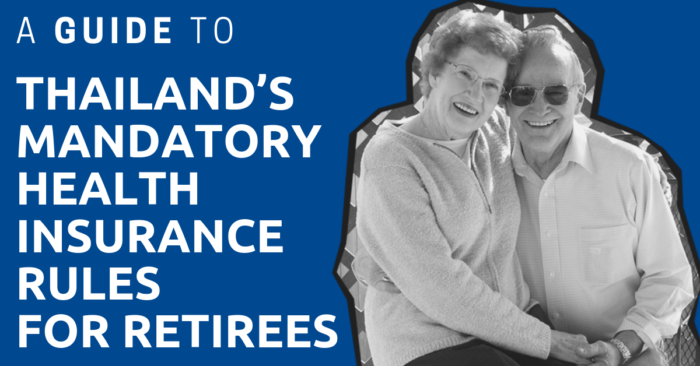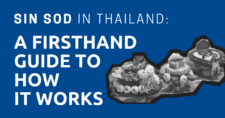
When you start your research on getting a retirement visa for your retirement plan in Thailand, the very first stumbling block you will encounter is health insurance.
This leaves you with many questions such as:
“Which health insurance should I get?”
“Can I use health insurance from my home country?”
“The insurance is very expensive for me, are there any other options?”
“What’s the easiest way to deal with this?”
To help you overcome this challenge, in this guide, I’m going to answer all of these questions and show you everything you need to know when it comes to health insurance for retirees in Thailand, including what kind of health insurance you need, plans, price, how to fulfill the requirements, and more.
"*" indicates required fields
Disclaimer: This article may include links to products or services offered by ExpatDen's partners, which give us commissions when you click on them. Although this may influence how they appear in the text, we only recommend solutions that we would use in your situation. Read more in our Advertising Disclosure.
Contents
- What is Compulsory Health Insurance?
- Health Insurance Requirements for Non OA Visa
- Health Insurance Options
- How Much Do I Have to Pay?
- What if I Can’t Buy Health Insurance?
- Do I Need to Keep Paying for Health Insurance?
- Does this Rule Affect Other Visa Types?
- What If I Don't Want to Buy Insurance?
- Which Health Insurance Plan Should I Buy?
(And How It’s Costing Them)
Most expats throw money away, get lost in red tape, and miss the local hacks that make life easier and cheaper. ExpatDen Premium gives you the secrets seasoned expats use to save, earn, and thrive beyond the basics, saving you thousands and opening doors you didn’t even know existed.
Here’s what’s inside:
- Housing Hacks: Slash your rent by 40% or more - because the locals are laughing at what you’re paying.
- Banking Mastery: Stop wasting on fees and get top exchange rates. Why give your money away?
- Healthcare for Local Prices: Quality treatment without the expat price tag.
- Visa and Legal Shortcuts: No more bureaucratic nightmares. Get the visa and residency secrets that others pay their lawyer dearly for.
- Deep Discounts: Find the savings locals rely on for groceries, dining, and more.
If you’re serious about making Thailand work for you, join ExpatDen Premium and make Thailand work for you.
What is Compulsory Health Insurance?
To understand the health insurance requirement for retirees, you first need to understand that there are various types of retirement visas in Thailand. And only some of them require health insurance.
There are mainly two retirement visas that require health insurance including:
- Non-immigrant OA visa, or the Non-OA visa for short
- Non-immigrant OX visa, or the Non-OX visa for short. It’s also known as the 10-year retirement visa.
Basically, you need health insurance if you apply for these visas, which are mainly available when applying outside of Thailand through the Thai Embassy or Consulate.
On the other hand, if you apply for the Non-Immigrant “O” visa based on retirement, then you don’t need health insurance at all.
Find out more: A Short and Simple Guide to Retiree Visa Thailand: Rules and Requirements
Good to know: If you apply for the Non-OA or Non-OX visa, you always need to have health insurance that fulfills the minimum requirements every time you extend your visa in Thailand. On the other hand, if you get a Non-O visa instead, you don’t need health insurance, both during the visa application and when extending your visa.
Health Insurance Requirements for Non OA Visa
To qualify for the health insurance requirement, you must have a plan that covers you:
- US$100,000 or THB3,000,000 for both general care and COVID 19
- For the entire of your stay in Thailand. For example, if your retirement visa lets you live in Thailand for one year, then you need to get a one-year health insurance plan.
However, not all Thai embassies and consulates adhere to this rule.
We’ve asked insurance brokers and retirees in Thailand who have non-immigrant O-A visas or non-immigrant O-X visas. They all said that their health insurance requirement was still THB400,000 for IPD and THB40,000 for OPD, which was the old requirements.
Before you buy health insurance, contact the embassy that you’re planning to apply for your Thai visa at and ask for the exact requirements.
Health Insurance Options
There are two health insurance options you have: local plans and international plans.
Local plans are inexpensive but come with very high deductibles. It’s good if you only need health insurance just to meet the requirement. Luma Long Stay Care falls into this category.
On the other hand, if you are able to spend more, I’d look at more comprehensive options from international insurers that far exceed the requirements of the visa. (Cigna Global Close Care Plan is recommended.)
While they are more expensive, they come with better coverage and are the kind of insurance you can really use when you need it.
Tip: If you buy a plan from an international insurance company, you may also need to ask your insurance company to give you a foreign insurance certificate. Basically, just ask your insurance provider to prepare it for you. Make sure that your health insurance policy clearly states the amount of IPD and OPD coverage you get to avoid mishaps with immigration officers.
Related article: Health Insurance in Thailand: What You Need to Know as an Expat.
Local Health Insurance Specifically for Non-OA Visa
Local health insurance is much easier to get. It’s cheaper, and local companies know the requirements well. In fact, many local insurance companies have plans specifically for expats applying for a retirement visa (Non-OA).
At the time of writing, the best available plan in this category would be Long Stay Care. It’s a plan that was specifically designed to meet the requirements of this visa and is available to anyone younger than 80 years old. No health check-up is required if you are older than 70 years old. Premiums can also be lower than THB 20,000 a year.
In addition to Luma, Navakij, Dhipaya, and Allianz also provide similar plans. You can use Checkdi to find out local plans for the Non-OA visa.
The main disadvantage of these local plans are the deductibles, which can be higher than THB200,000. The overall coverage is also much lower than what you’d get with expat health insurance.
So, it’s an affordable option for those who need health insurance just to fulfill the visa requirements. But the coverage might not be enough to visit a hospital in Thailand.
Expat Health Insurance
If you want to find health insurance that does more than just fulfill the health insurance requirement for the Non-OA visa, you should check out expat health insurance provided by an international insurance company instead, for several reasons:
- Coverage limits tend to be much higher than what you get with local plans. For example, you may get THB 35,000,000 in coverage instead of THB 3,000,000.
- They also cover your health expenses both inside and outside of Thailand, depending on your chosen areas of coverage.
- International health insurance companies must follow the insurance regulations of the countries in which they operate, which are usually stricter than those in Thailand. This means they are less likely to discontinue your plan or increase premiums if you make an expensive claim.
The main disadvantage of expat health insurance is the price. It can be expensive, especially when you’re 60 years old or older. Your options become even more limited if you’re over 70.
That said, if you want to check out some expat health insurance, one good option is Cigna. They have a senior plan, which is basically an insurance plan for those aged 60 years old and above.
The best thing about this plan is that it doesn’t have any age limits. You also get full coverage on cancer and get an annual limit of US$1,000,000.
The plan is becoming more popular for retirees in Thailand.
How Much Do I Have to Pay?
In case you buy a plan from local companies that operate just to satisfy visa requirements, it should cost you less than THB20,000 a year.
Note, though, that these plans come with deductibles of over THB200,000. You would need to pay the deductible first before the insurance company covers you.
On the other hand, for normal health insurance plans, premiums depend on your age, pre-existing conditions, coverage amounts, and coverage areas. You could end up paying more than THB100,000 for health insurance since health insurance for those who are older than 50 tends to be expensive.
What if I Can’t Buy Health Insurance?
If you can’t buy health insurance for whatever reason and want to retire in Thailand, you have three alternatives.
- Get a Normal Non-Immigrant Visa “O” Outside of Thailand. With this method, it’s possible to meet only the financial requirements without the need for health insurance. However, this option is only available at certain Thai embassies or consulates.
- Apply for a Non-Immigration Visa “O” inside Thailand: Alternatively, you come to Thailand on a visa-exemption or a tourist visa and then apply for an extension of stay based on retirement. It’s basically a retirement visa, but immigration officers in Thailand won’t ask for health insurance requirements. However, it’s more complicated than applying for a retirement visa from outside of Thailand. It’s required you to open a bank account in Thailand but it is very challenging to do it unless you have a long-term visa.
- Get a Thailand Destination Visa: While this visa is mainly for digital nomads, some retirees still opt for it to avoid dealing with health insurance in Thailand. However, it comes with two major disadvantages: First, you must be able to prove your remote work. Second, you may not be able to open a Thai bank account with it.
- Get the Thai Privilege Card: The last option is to look into other visa options instead, such as the Thai Privilege Card.
Find out more: A Short and Simple Guide to Retiree Visa Thailand: Rules and Requirements
Do I Need to Keep Paying for Health Insurance?
Here’s a simple rule: if health insurance is required when applying for your visa, you need to have health insurance when extending it inside Thailand.
For example, if you come to Thailand with a Non-OA visa, you need to keep paying for your health insurance when extending your visa in Thailand.
On the other hand, if you get a Non-O visa instead, you don’t need health insurance during either the visa application or the visa extension.
Does this Rule Affect Other Visa Types?
As of now, if you hold a non-immigrant B visa, non-immigrant EDU visa, or non-immigrant O visa for marriage, you don’t need health insurance.
However, it’s possible that that same rule will apply to other types of long-term visas in the future. Coverage amounts, though, might be different. For example, you now need to have health insurance if you want to get a LTR visa in Thailand.
This is because health insurance requirements for getting a visa in Thailand are becoming more common.
What If I Don’t Want to Buy Insurance?
If you do not want to buy health insurance, one of the best ways is to apply for a non-immigrant O visa instead of a non-immigrant OA.
But you still need to have proof of financial means with THB 800,000 in your bank account. Read our guide to retirement visas in Thailand to find out more.
Which Health Insurance Plan Should I Buy?
Regardless of the law, it’s still a good idea to get health insurance while in the country.
- If you want a comprehensive health insurance plan, check out Cigna Global.
- If you need health insurance to qualify for the retirement visa and have some good coverage, check out Luma Long Stay Care.
- If you want to find the cheapest plan available to fulfill the health insurance requirement, you can use CheckDi.com.








